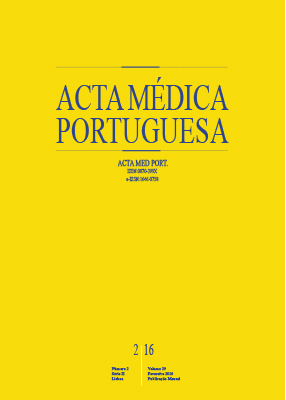Development and Validation of the National Functionality Table for Chronic Diseases
DOI:
https://doi.org/10.20344/amp.6692Keywords:
Adult, Chronic Disease, Disability and Health, International Classification of Functioning, Portugal.Abstract
Introduction: Systematic evaluation and registration of adults functionality with chronic diseases is relevant, because it allows: ‘flattening’ health, social and employment policies, according to the person’s functionality with chronic diseases, providing health and social professionals with a data collection, which complements disease records, and finally, measuring functionality gains. The objective of the study was to develop a National Functionality Table for active age adults with chronic disease, according to the International Classification of Functioning, Disability and Health of the World Health Organization.
Material and Methods: Quantitative and qualitative methods were used; literature review (17 articles), focal group (nine experts), Delphi panel (16 experts) and exploratory study (309 persons with chronic diseases).
Results: The literature review identified 67 limited activities in the study population, from which 40 activities were selected by the focal group and 38 activities were validated by the Delphi panel.
Discussion: In order to test the psychometric properties we have compared the average value of all possible coefficients of internal consistency type (split-half). When analyzing the discrimination of functional levels in different samples, equality of variances was verified, using the Levene test as well as the “t” test. According to the observation and analysis of α Cronbach coefficient we have found that the National Functionality Table shows good reliability levels. From the main component analysis, five dimensions were identified.
Conclusion: the National Functionality Table has appropriate psychometric characteristics in respect to its consistency, reliability and internal validity.
Downloads
Downloads
Published
How to Cite
Issue
Section
License
All the articles published in the AMP are open access and comply with the requirements of funding agencies or academic institutions. The AMP is governed by the terms of the Creative Commons ‘Attribution – Non-Commercial Use - (CC-BY-NC)’ license, regarding the use by third parties.
It is the author’s responsibility to obtain approval for the reproduction of figures, tables, etc. from other publications.
Upon acceptance of an article for publication, the authors will be asked to complete the ICMJE “Copyright Liability and Copyright Sharing Statement “(http://www.actamedicaportuguesa.com/info/AMP-NormasPublicacao.pdf) and the “Declaration of Potential Conflicts of Interest” (http:// www.icmje.org/conflicts-of-interest). An e-mail will be sent to the corresponding author to acknowledge receipt of the manuscript.
After publication, the authors are authorised to make their articles available in repositories of their institutions of origin, as long as they always mention where they were published and according to the Creative Commons license.









